TOK TOK TOK / “Sometimes I Feel Like A Motherless Child”
It is one thing to make something out of nothing, but it’s a black thing to make beautiful music out of troubles, and for most of us there is no greater trouble than being a motherless child.
We round out our celebration of Mother’s Day with negative statements that affirm the central importance of mothers.
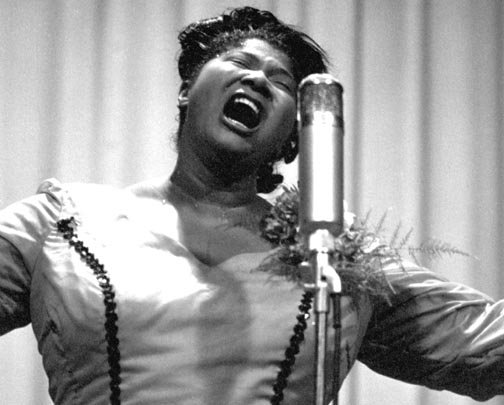
Mahalia Jackson is widely known as the world’s greatest gospel singer but although her iconic musical status is unassailable, the current reality is that more people have “heard of” her than have actually “listened to” her. Moreover, people assume they know what she will sound like because they know what gospel sounds like. But Mahalia Jackson was not only the greatest, she was also a musical rebel who radically changed 20th century vocal music in America. Mahalia’s version illustrates the revolutionary aspects of her approach.
Whereas “Motherless Child” is generally accepted as a Negro spiritual, “Summertime” from George Gershwin’s opera, Porgy and Bess, is completely outside of the religious repertoire. What is incredible about Mahalia is that she not only sang in a style influenced by the jazz of her hometown of New Orleans, she also sang popular music and jazz, even going so far as to perform at the Newport Jazz Festival and to record with jazz musicians. Whereas there is nothing particularly noteworthy about that today, back in Mahalia’s day it was considered one short step from blasphemy, yet, Mahalia, gospel’s greatest, was comfortable singing jazz in public.
Beyond the radicalness of her repertoire choices, this is also a radical treatment in melding the two very dissimilar songs into a seamless whole. Notice that Mahalia not only sings “Summertime,” she transforms it to fit her reality, thus, the line “your daddy’s rich / and your mama’s good looking” becomes “your daddy ain’t rich / and your ma is good looking,” thereby excluding the possibility of paternal wealth. Then, far beyond that change, Mahalia goes on to sing “Motherless Child” as though it was a “Summertime” verse. Finally, Mahalia hums a verse of “Motherless Child” in her stunningly beautiful voice. Overall it’s both a fascinating study in musical transformation, and a gripping vocal performance.
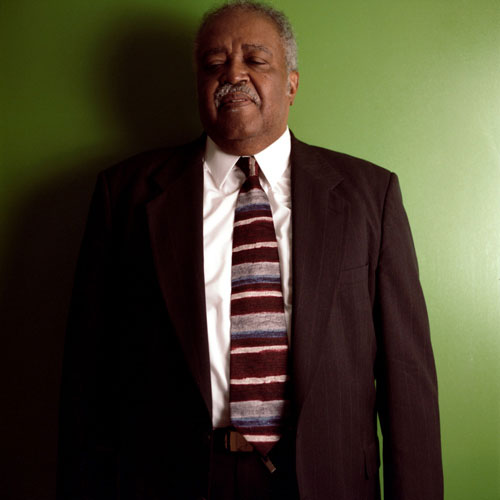
Next, jazz pianist Ray Bryant gives a solo reading from a 1977 concert at the Montreaux Jazz Festival. Bryant became a big name in popular music with a dance-craze number, "Madison Time” (1959). Here Bryant demonstrates the depth and breath of his jazz piano knowledge and ability. His sophisticated sonic investigation opens with modern chording a la McCoy Tyner and Ahmad Jamal before going into some deft left-hand work worthy of the great Art Tatum. Hints of stride offer exciting texture to the improvisation, and as is evident from the applause, the audience thoroughly enjoyed Bryant’s offering.
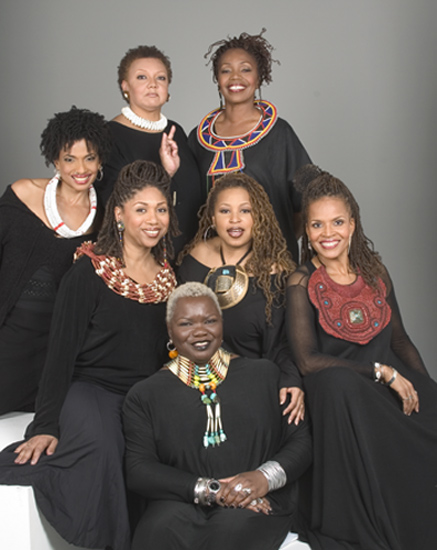
The all-female a capella group, Sweet Honey In The Rock, follow with a version that stylistically hues close to the spiritual tradition but which mixes the gospel quartet style with the choral sound of the spirituals. Note in particular the lead voice call and the group response. Also of deep interest is the booming bass line characteristic of the gospel quartet tratdition. Sweet Honey is awesome.
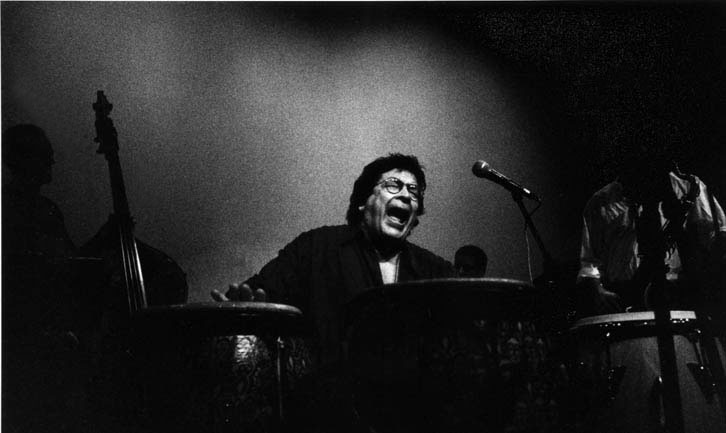
Next Ray Barretto, who died in February 2006, offers the most radical treatment of all. Barretto’s version is in a Latin jazz mode. The base of the song is an Afro-Cuban rhythm sounded on a cowbell, but beyond the rhythm, both the melody and the harmony are transformed and used as a springboard for stirring solos from trumpeter Joe Magnerelli and alto saxophonist Myron Walden, who is particularly fiery. This version goes far, far beyond the basic sadness of the song to give us glimpses of the conditions that might lead someone to feel motherless.
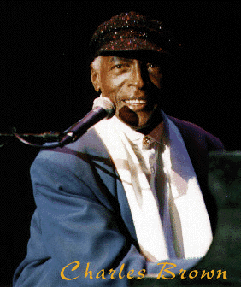
“Mr. Please-Come-Home-For-Christmas” Charles Brown follows with a blues treatment that is mournful but not depressing, indeed it is almost uplifting in its affirmation that it is only sometimes that Mr. Brown feels down. Brown also alters the song structure to deliver his profound reading that manages to be both bluesy and almost religious in tone.
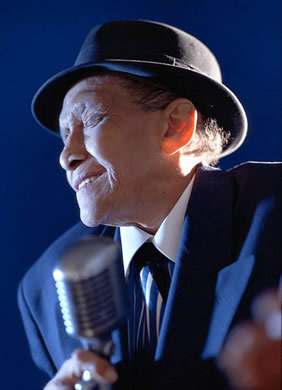
Vocalist Jimmy Scott is known for his unusually high-pitched voice, the result of a rare disease that permanently suppresses normal hormonal developments. Although Scott’s female-sounding voice is an acquired timbre not to everyone’s taste, Jimmy Scott is truly effective in his presentation of the lyrics, relying as much on his timing and phrasing as on the sound of his voice. His pace is as deliberate as a dead man walking to his execution. With it's dramatic string accompaniment, the arrangement could easily have degenerated into melodrama, but Scott soars above almost as if uttering his last words as he steps off to meet his maker.
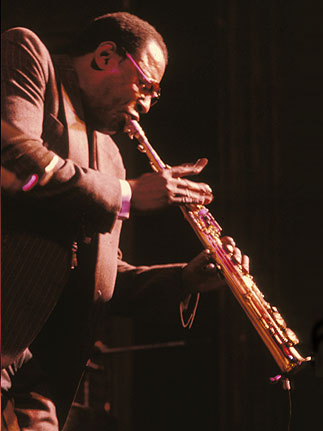
Archie Shepp, who is known primarily as a tenor saxophonist, offers a sterling soprano rendition in duet with pianist Horace Parlan. Shepp’s silvery soprano is both beautiful and bittersweet. His solo is meditation music; some of the improvised lines sail, swoop and flutter like a kite floating on a gentle breeze that rises and falls. Shepp investigates both the top and the bottom of his horn, the high notes piercing but full, the low notes almost a fulsome growl. This is an exemplary jazz rendition, full of exploratory improvisation, some of it subtle, others of it outright alterations, all of it sensitively rendered.

At the end of this roundup, I’m most moved by Tok Tok Tok’s almost motionless utterances. Tokunbo Akinro’s quiet, supple singing is so absolutely lonely, so truly lonely, that she sounds like someone who can’t cry anymore because they are all cried out. This is a minimalist exploration, the journey begins and ends with her sitting alone, unmoving at the crossroads. And then Morten’s tenor slides in with a long train whistle moan.

Her partner, Morten Klein is near perfect. His solo is a movie soundtrack for loneliness, walking down a long, winding road to nowhere.
The closing chorus and half are sublime. First Tokunbo is paradoxically both defiant and affirmative. She closes out on the verge of existential despair—I will keep going, but I know it is useless. And then she ends on the upbeat, leaving us waiting for more, but there is no more. When you are a motherless child, the end often comes well before you expect or want it to arrive.
Thankfully, most of us are not motherless, and therefore these songs are marvels of exploration for us to enjoy rather than autobiographical tracts mapping the trajectory of our sadness. Happy Mother’s Day.
—Kalamu ya Salaam
A heavenly thing
Baba, this group of covers of "Motherless Child" reminds me of your "Summertime" set (and not just because Mahalia had the moxie to mix 'em). Both sets are based on classic tunes that are covered by such a variety of artists and in such different ways, that the sets sound like a one-song journey through the many styles of Black music. We get some gospel, some jazz, some blues, some pop and even some Afro-Latin grooves. Unless you're a reggae exclusivist or hip-hop head, there's bound to be something here for you.
(And by the way, for those who aren't up on the archives, now would be a good time to mention how to access our past posts. There are two basic ways to access the archives: one, by browsing; two, by searching. At the far right of the homepage, under the heading 'archives,' there are four links: 'classic,' 'contemporary,' 'cover,' and 'by week.' Click on any of those links and you'll be able to browse through our past posts. Or, if you're looking for a particular artist or song, simply type the artist name or song title in the 'search' box. If you want to check out Kalamu's post on "Summertime" songs, simply type 'summertime' in the search box and it'll come up—along with any other time we've mentioned the song or word 'summertime.')
I enjoyed every one of these versions, but I have to make a brief comment about my favorite four. (I won't narrow it down any further than that.) First, I like Jimmy Scott's version because of the pacing and because of Jimmy's vocal ability. Jimmy sings the vocals at a tempo that just feels right for such a sad song: slow, slow, slow, slow. Note too that Kalamu is right about Jimmy's voice. His vocal talent is prodigious, but he definitely sounds like a woman! I've listened to all of these songs several times on random and when Jimmy's version comes on, I've yet to realize that I'm listening to a man until I check. I have to say, I'm surprised I like this version so much because, in the past, I've always reacted to Jimmy Scott's voice as though it was a gimmick. It just seemed to weird to be plausible. But in this case, I have to make an exception. When something sounds this good, I don't care who's singing it.
Sweet Honey's version just doesn't let up. The lead vocals have a piercing intensity that builds and builds and just keeps on building. The other sisters match the lead, singing louder and louder, repeating those same lines ("Sometimes I feel like" / "I can hear her calling me") until it's almost painful. By the time they reach the climax, you feel like they're singing inside of you. The other thing I like is how much hope and happiness Sweet Honey manages to inject into this blues piece. "I can hear my mother's voice calling me back," they sing. "I miss you, but I'm a long way from home." They show us that the lyrics aren't necessarily about a child without a mother, they could also be about a child who is simply a long way from home. It's a great performance by a group of singers who specialize in great performances. If you don't know anything about Sweet Honey In The Rock, you might want to get yourself to a record store, post haste.
The late, great Ray Barreto's version is so good for the same reason Angélique Kidjo's version of "Summertime" is so good. It isn't just a cover or a version, it's a highly innovative, total reinterpretation. I never would've imagined that Latin percussion would work with this tune, but Ray pulls it off. The thing I like is, even though Ray's take is a radical departure from the original style, tempo and overall feel of the tune, his version remains very recognizably "Motherless Child." It's like being at a party, surrounding by good food and good people; you're dancing, eating and drinking, living it up; then right in the middle of all that, you get a small, but intense bit of a blue feeling. It doesn't stay with you and it doesn't kill your good vibe, but you can't deny it either. That's the feeling I get from Ray's "Motherless Child." So if I was forced to pick just one version, I'd probably say his is my favorite.
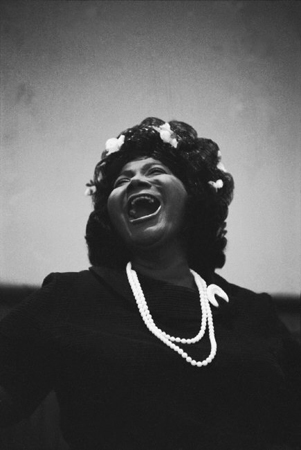
I have to close with Mahalia's "Summertime"/"Motherless Child." The woman's voice is simply superlative. A few months ago, I said that Nancy Wilson had the best singing voice I'd ever heard. (And I've heard a lot of them.) If there's any one voice that could give Nancy a serious run for her money, it's Sister Mahalia's. What I find so incredible about Mahalia is that she seems to have equal power (meaning, lots and lots of it) through the entire range of her voice. Meaning, she performs her extreme high notes and her rumbling bass notes with the same ease, clarity and richness that characterizes her 'natural' midrange. When I listen to Mahalia sing, I sometimes find myself not even hearing words: all I hear is beautiful, beautiful waves of sound. If the human race had to pick just one voice to exemplify what the art of human song is all about, we couldn't do any worse than Mahalia Jackson.
All of that said, I didn't single out these four versions to say that I don't like the other versions. Truth is, I appreciate every one of these takes on the classic "Motherless Child." (Archie Shepp's sweet, sweet high notes are playing right now, and there's not a thing wrong with that!) As much as I listen to music, I always find it amazing that artists can find new ways to interpret the same material. It's a heavenly thing. ... To all the sisters, daughters, grandmothers, great-grandmothers, aunts, nieces, sisters-in-law, and of course, mothers (!!!), Happy Mother's Day. Your babies love you. Keep on keeping on.
—Mtume ya Salaam
P.S. Am I the only one who thinks Ray Bryant's version sounds like "It Don't Mean A Thing, If It Ain't Got That Swing"?
This entry was posted on Sunday, May 14th, 2006 at 12:09 am and is filed under Cover. You can follow any responses to this entry through the RSS 2.0 feed. You can leave a response, or trackback from your own site.
3 Responses to “TOK TOK TOK / “Sometimes I Feel Like A Motherless Child””
May 15th, 2006 at 10:41 am
What can be said about Mahalia has already been said. Tok Tok is a decent enough performer, but this song makes her sound flat (or maybe I’m just spoiled by the richness of Mahalia’s voice). The ‘jazz’ treatment (ala bass) is nice but almost makes the song sacrilege for “old music” heads.
Sweet Honey In The Rock on the other hand…I wish you profiled them! At first, I wondered how 6-7 ladies can take a typical soloist work and do it. Of course with the fervor, feeling, and soul expected, they did it, with ad-libs to boot. Their version speaks of REDEMPTION with your mother and they did it WITHOUT instruments.
May 18th, 2006 at 8:55 am
Aight. Can’t help it. Gotta say it. How blessed I am to to have ears to hear! Thanks ever so much, Kalamu, fuh pullin alla these versions of such a passionate classic.
May 19th, 2006 at 8:08 am
For the southern soul and hip hop heads, there is a couple of tracks to check: the Ghostface Killa “Motherless Child” cut (with a lot of credible lines there) and the source of the track, O.V. Wright version.
I’m enjoying the Tok Tok Tok one. Thanks.
Leave a Reply
| top |